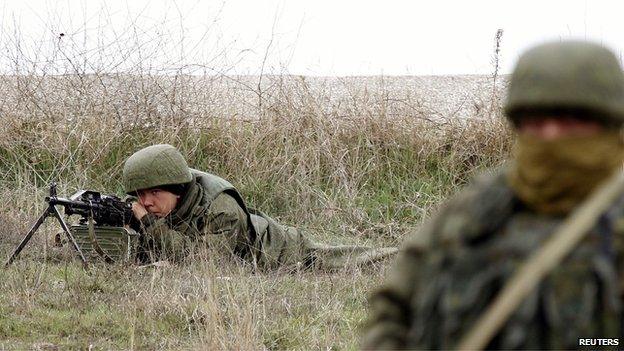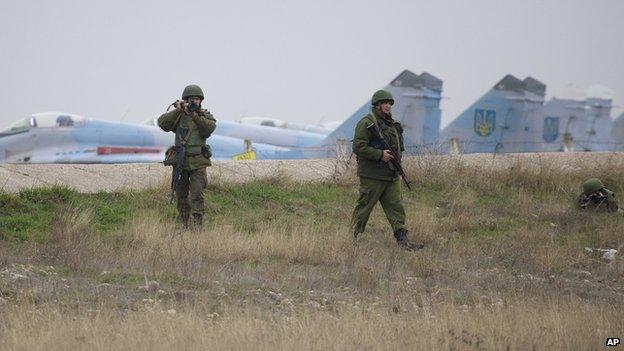Marched off at gunpoint in Crimea
- Published

Russian-led troops forced the Ukrainian military to leave Belbek airbase
The Belbek airbase in Crimea is now famous for a tense confrontation between soldiers in Russian uniforms - without insignia - and Ukrainian troops, filmed by Western journalists.
Here Olga Ivshina, a BBC Russian Service reporter, describes her own tense exchanges with Russian-speaking troops controlling the base just outside Sevastopol.
"Don't move or I'll shoot!" someone shouts from the bushes. Slowly, I turn my head and see a gun fitted with a silencer, pointing at me.
Military bases are not designed to accommodate journalists - you are left standing there for hours, with no power points or toilets. Just a narrow road and endless bushes.
Just a few minutes ago, the idea of straying a few hundred metres from the crowd of colleagues seemed quite reasonable and safe to us.
"Halt!" the soldier shouts again. Then comes a shout in response, not far off - strange, but these armed men apparently have no walkie-talkies. We stand there with our hands in the air, repeat that we are journalists, and just wait.
The soldier keeping us in his sights is wearing Russian army-style camouflage, but without any insignia.
Two more run up to us a minute later. One has a Kalashnikov assault rifle, the other is also laden with a sniper rifle and grenade-launcher. I think they have rather overestimated the threat posed by our camera team, but I do not tell them that.
Translation of exchange of words as Russian troops fired into air as Ukrainians march on Crimean airbase
"You should come with us," the breathless, heavily-armed man tells us politely. It seems impossible to refuse such an offer.
Under suspicion
We march on, past a couple of trenches. The people sitting in them watch us, looking surprised.
We enter a small, dilapidated brick building. There are some bullet holes in the walls.
"Looks like we're not the first ones here!" I say, trying to be light-hearted.
The soldiers then smile and put their weapons down. Things get a little calmer.
"Your documents please!" We show what we filmed with the camera and open a rucksack.
That morning we haven't recorded much - and clearly it is of no interest. But they ask us to wipe it anyway, just to be sure. Slowly I retrieve a water bottle and chocolate bar from the rucksack.
"Snickers?" asks a soldier. "You shouldn't eat that American food. Bad for your health."
"You can have it if you want," I say.
"No, no. We don't eat American food," says the soldier with the grenade-launcher, smiling contentedly.
We carry on emptying the rucksack - and reach the first aid kit.
"American kit!" says the man with the grenade-launcher. Instantly the soldiers raise their rifles again.

Ukrainian fighter jets remain grounded as men in Russian uniforms patrol the base
"Judging by your physique, you are both British spies!" says another soldier rapidly.
"Is that a compliment or a rebuke?" I ask. Tense silence.
Tattoo
The soldier who has just accused me of spying looks straight in my eyes. Judging from his behaviour with the other soldiers he must be of a higher rank.
Under his camouflage jacket I see a vest with blue stripes. Then I spot a tattoo on the back of his hand: "za VDV", signifying he is a "paratrooper".
"And your boots are a bit special," he tells me. "Ordinary people don't wear boots like that. Quality leather."
"Yes, they're good," I reply. "But they're rather small. They won't fit you."
"Do you have tattoos?"
"No," I answer.
"Take your clothes off, we're going to check."
"Check the guys, but leave the girl alone!" a man barks. He has just approached us, and seems to be the senior officer. "Olga - you're a Russian citizen? Come with me - we need to talk."
The officer takes me to one side and explains how important it is now to avoid provocations, how biased Western journalists are, and how important it is for everyone to do an honest job.
"And don't come here anymore," he says finally. "After all, you and I are Russian citizens. I don't want to shoot my own people."
Before saying goodbye the soldiers photograph us on their mobile phones. They say they will do a search on a database and find out about our spying.
They show us how to get back to the main road and ask us again not to look back.
"Olga, you and I will still meet again in Moscow," adds the officer, with a wry smile.